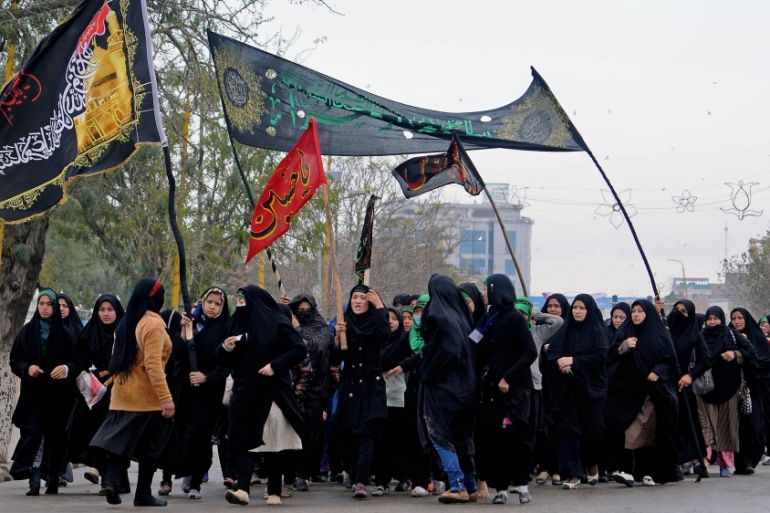Civilians armed to protect mosques during Ashura
People in Kabul raise concerns at arming of civilians to guard Shia places of worship during Muharram.

Authorities in Afghanistan have tightened security in Kabul in advance of Ashura on Sunday, the holiest day in the Shia Muslim calendar, fearing attacks on worshippers.
The Afghan capital witnessed increased security, with extra police checkpoints set up in parts of the city where Ashura processions traditionally take place.
Keep reading
list of 4 itemsMuslim pupil loses UK court bid over Michaela school prayer rituals ban
Photos: Sikhs celebrate harvest festival of Baisakhi, marking new year
Masses gather for Eid celebrations in India
But Kabul residents have raised concerns about the government’s security plan, which includes arming hundreds of civilians to help protect mosques and religious processions that have come under attack recently.
Many residents Al Jazeera spoke to say the policy could be misused in the future.
Last week, the government provided basic defence and weapons training to at least 500 volunteer guards to protect nearly 400 Shia mosques in Kabul.
“I think at the moment it is better to have extra security, but in the long run I don’t feel comfortable with the idea of civilians in possessing weapons,” Mohammad Sabir, a 50-year-old Shia worshipper, told Al Jazeera.
“Will these weapons be taken back from them? Who will keep track of it?” he asked.
Afghanistan, a majority Sunni Muslim country, has seen a series of attacks on the Shia community over recent years claimed by the Islamic State of Iraq and the Levant (ISIL, also known as ISIS), raising fears of sectarian violence.
Muharram, which began on September 20, marks the start of the Islamic new year. Shia Muslims observe Muharram as a period of mourning for the seventh-century killing of Prophet Muhammad’s grandson.
READ MORE: ‘Our lives don’t matter’ – Anger in Kabul after US raid
General Afzal Aman, the acting director-general of the Kabul Garrison, told Al Jazeera that at least 500 young civilian guards have been trained and equipped to provide security for religious places during Muharram alongside government forces.
“They have learned basic skills on how to provide security. We are hoping this will work in our favour … we have already faced two attacks since the beginning of Muharram,” he said.
“Police officers are also trying their best to provide better security as there are serious threats, but we hope that with all these intelligence and security measures, nothing will happen.”
Aman, however, did not answer whether there is a long-term plan on how the authorities will keep track of the civilian guards.
READ MORE: Civilians caught in crossfire of war against Taliban
The selection of guards was made by local community leaders and in cooperation with mosque committees, followed by the distribution of “light weapons”, General Aman said, without elaborating on which weapons were distributed.
On Thursday, three people, including two policemen, were killed and 16 others injured in a blast near the Chendawol area of Kabul’s old town that has a significant Shia population.
A day later, at least five civilians were killed when a suicide bomber blew himself up close to Hussainia mosque in the capital. As many as 19 others were wounded in the attack.
Shafi Karimi, a resident of Kabul, expressed frustration over the failure of the Afghan government and police force in not being able to provide security.
“What is the police for? The Afghan government always brags about its police saying, ‘we have the most powerful team’. But why can’t they provide better security?” he told Al Jazeera.
“Why would they distribute guns? The police should find another way as this might lead to a civil war in the country.”
‘I can save people’
But not everyone shares the same view on arming civilians given Afghanistan’s precious security situation.
The Taliban, which was driven out of power by the US-led forces in 2001, now controls almost one-third of the country. In recent years, ISIL has also grown in strength.
Hamayoon Amiri, an 18-year-old civilian guard, believes it is his duty to protect people from attacks by ISIL or the Taliban.
He said he does not care whether the “person is a Shia or Sunni”, he simply wants to “protect the people of Afghanistan”.
|
|
“It’s been a week since I started performing my duty outside Al-Zahra mosque in Kabul’s Dasht-e Barchi area,” he said, adding that he will move to another mosque to provide security in the coming days.
“My commander trained us on how to use a gun. He fought against the Soviet invasion and I respect him a lot,” Amiri said.
“The government has failed numerous times to protect us, so now it is our duty as Afghans to step up. We don’t have any more options.
“I know I can save people, I am well trained,” he added.
Amiri’s senior commander, who did not wish to be named, told Al Jazeera that between 2,700 and 3,000 young men have been trained to provide security across Afghanistan.
He said that the security measures are not temporary and will continue after Muharram ends.
“The government is now relying on us and we are ready to help,” he said.
Follow Shereena Qazi on Twitter: @ShereenaQazi